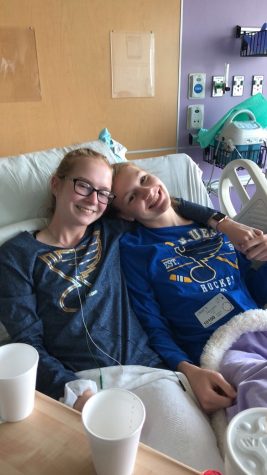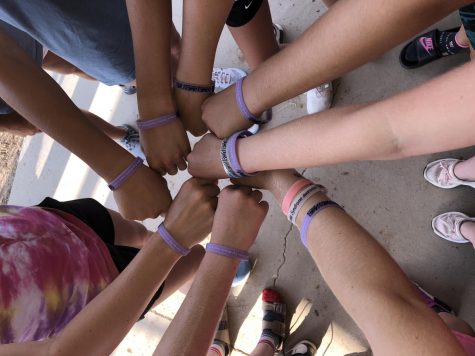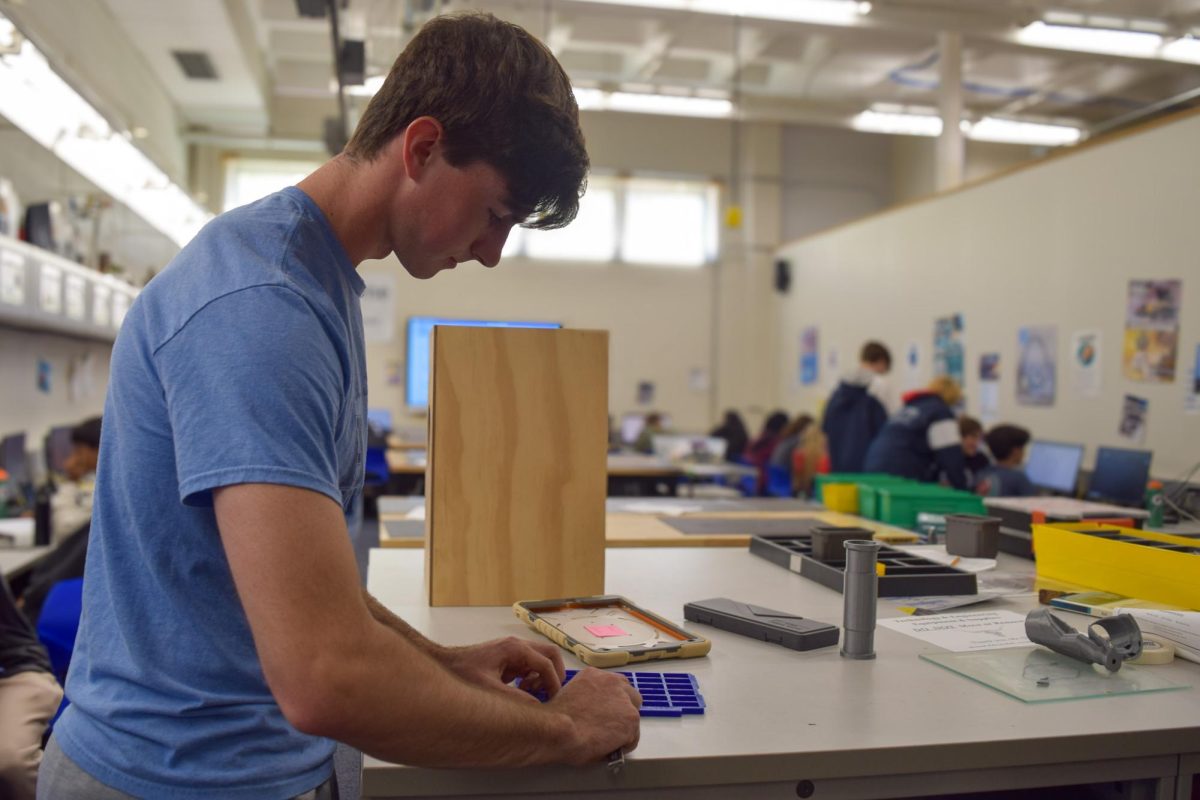The stark lights of doctors’ offices are disorienting. Senior Maggie Lyerla bounces her leg up and down nervously, awaiting a new diagnosis or another doctor telling her it’s all in her head. For Lyerla, she knows these situations all too well.
Lyerla was diagnosed with Ehlers-Danlos Syndrome (EDS), a rare connective tissue disorder, her freshman year. EDS makes joint dislocations easier and makes your skin stretch.
With fewer than 200,000 US cases reported per year, it has been a struggle for Lyerla to find doctors that know enough about EDS to help her. In May 2018, Lyerla started showing gastrointestinal (GI) symptoms. The GI doctor she went to showed her a video called “How stress affects your gut” by Laci Green. The video has since been deleted, but it explained how stress or anxiety is the cause of many teens’ stomach pain. The doctor told her that when she showed the video to other patients, their symptoms went away, and they realized it was just anxiety.
“I was honestly hurt that my doctors who were supposed to be helping me thought that this five minute Youtube video would cure me,” Lyerla said. “She disregarded my symptoms and didn’t really believe what I was saying.”
By February 2019, her symptoms had not gone away and were getting worse. Lyerla went back to her dietician, who decided she needed to be admitted to St. Louis Children’s Hospital that day due to dehydration.
“I didn’t realize how bad I was at the time. I had six and a half bags of saline while most people only have one. I didn’t understand because I felt perfectly fine,” Lyerla said. “I was truly on the brink of the euphoria before you go into a coma, but I had no idea.”
When Lyerla was admitted to St. Louis Children’s Hospital for the first time, they prescribed her Zofran, an anti-nausea medicine used to treat cancer patients after chemotherapy.
“I felt like I didn’t really deserve the medicine; there are other people that have it worse,” Lyerla said. “I didn’t really understand that I was going to die too. If I hadn’t been admitted that day I could’ve gone into a coma. This made me doubt myself, and I’m still afraid people don’t believe me when I mention symptoms.”

Watching the 2019 Stanley Cup Finals, senior Maggie Lyerla and senior Megan Renetzky hang out in the hospital during Renetzky’s visit.
Lyerla had been vomiting multiple times a day along with other GI problems. The Zofran that was prescribed to her was helping a little bit, but she was still losing a lot of weight. The doctors tested her to figure out why these problems were occurring but could not find a solid answer. It was soon after this hospital admission that Lyerla’s doctors misdiagnosed her with an eating disorder (ED) called Avoidant/Restrictive Food Intake Disorder (ARFID).
“Once ARFID was put on my chart, they referred me to a lot of therapists, but only one of the four said I had an ED. The other three said there’s clearly something wrong, but it’s not anything mental like ARFID,” Lyerla said.“It was really frustrating that so many of the doctors thought I was faking it or had an ED.”
Although the therapists proved that she did not have an ED, the doctors were running out of options. Her heart started to deteriorate, which most doctors call “body wasting” when there is a loss of a lot of body fat and muscle. The doctors wanted to admit her again, but Lyerla had a dance recital and refused.
“I told them that dying can wait until Monday,” Lyerla said. “They told me my heart could stop on stage, but I didn’t even care. I just wanted to dance, even if it was my last time.”
After her recital, Lyerla was admitted to the hospital once again, but the doctors felt that she needed to gain her weight back. Because Lyerla had lost so much weight, they decided to send her to The Emily Program, an ED clinic in St. Paul, Minn so she could begin recovering. The Emily Program, while it is a clinic for ED patients, also had diets and plans that could help Lyerla.
“It kind of felt like I was being taught how to have an eating disorder,” Lyerla said. “I felt like I couldn’t trust myself; I got worried that maybe I was wrong, and they knew my body better because I was being brushed aside so much.”
The first thing the therapist said when Lyerla arrived at the clinic was that she didn’t have an ED. Lyerla’s hospital notes said that she was 100% food compliant which wouldn’t happen with ARFID.
“Hearing that made me so happy–a medical professional saying what I have been saying for the past months, that was the validation I needed to keep going and try to finish the program early,” Lyerla said. “For me, it ended up being more of a summer camp because I had so much freedom. I didn’t have a mental illness that needed to be monitored.”
Lyerla finished the program in four weeks, being discharged about two weeks sooner than most. Lyerla is a triplet and she was more 500 miles away from her sisters who have always been with her.
“I really took them for granted because I never thought they wouldn’t be by my side. It felt like a huge part of me was missing while I was in Minnesota. I was really happy to see them when I got home,” Lyerla said.
Once Lyerla was finished with the program, the doctors were pleased with her recovery and her symptoms slowed down. When she got back, the doctors took ARFID off of her chart and discharged her from the hospital. Lyerla continues with physical therapy and monthly doctor visits to make sure her symptoms don’t begin again.

Showing off their new Ehlers-Danlos Syndrome (EDS) bracelets, senior Maggie Lyerla hands out bracelets to the softball team.
“After going to the EDS conference in July, I started posting on Instagram for EDS month and rare disease month,” Lyerla said. “I met one of my really good friends on the internet through an EDS group; we can really relate and share our struggles. It’s really nice to have someone who understands.”
Continuing to battle EDS every day, Lyerla is grateful to have friends around to support her journey to stay healthy.
“You really learn who your true friends are. The people who stuck around were the people who I actually enjoy having in my life,” Lyerla said. “Those are my best friends. It’s nice knowing I have a support system behind me that’s here for me and who I am.”
Lyerla doesn’t see her body as a hindrance. She continues to do physically challenging activities she enjoys, such as dance.
“It [EDS] made it a lot easier for me to see the positives in things. You can’t control what your circumstances are, but you can control your attitude,” Lyerla said. “And that can make anything bearable.”



![Focused on providing exceptional service, sophomore Darsh Mahapatra carefully cleans the door of a customer’s car. Mahapatra has always believed his customers deserve nothing less than the best. “[If] they’re trusting us with their car and our service, then I am convinced that they deserve our 100 percent effort and beyond,” Mahapatra said.](https://pwestpathfinder.com/wp-content/uploads/2025/10/DSC_0018-1200x800.jpg)
![Sophomore Aleix Pi de Cabanyes Navarro (left) finishes up a soccer game while junior Ava Muench (right) warms up for cross country practice. The two came to Parkway West High School as exchange students for the 2025-2026 school year. “The goal for the [exchange] program is to provide opportunities for both Parkway students and our international exchange students to learn about other cultures, build connections and become confident, capable, curious and caring — Parkway’s Four C’s — in the process,” Exchange Program Lead Lauren Farrelly said.](https://pwestpathfinder.com/wp-content/uploads/2025/10/Feature-Photo-1200x800.png)

![Gazing across the stage, sophomore Alexis Monteleone performs in the school theater. The Monteleone family’s band “Monte and the Machine” has been releasing music since 2012, but Alexis started her own solo career in 2024 with the release of her first single, Crying Skies. “My whole family is very musical, [and I especially] love writing [songs with them],” Monteleone said.](https://pwestpathfinder.com/wp-content/uploads/2025/09/DSC7463-1200x798.jpg)
![Amid teaching a lesson to her AP Calculus BC class, Kristin Judd jokes alongside her students in their funny remarks. Judd has always enjoyed keeping the mood light in her classroom, along with on the volleyball court. “[I enjoy] that side talk where you see [or] overhear a conversation and chime in, or somebody says something funny,” Judd said.](https://pwestpathfinder.com/wp-content/uploads/2025/09/image-1200x730.jpg)
![Eyeing the ball, junior Ella McNeal poses for her commitment pictures at Clemson University. McNeal’s commitment comes after months of contact with top Division 1 soccer programs. “ It has taken a lot to get to where I am, but I know that [what] I've already been through is just the beginning, and I can't wait for what is to come,” McNeal said.](https://pwestpathfinder.com/wp-content/uploads/2025/09/IMG_4926-1200x900.jpeg)


![Senior Adam Zerega stands with senior Dexter Brooks by farm equipment. Zerega often worked with friends and family on his farm. “I've been able to go to my family's farm since I was born. I [spend] at least three weekends a month [on the farm], so I'm there all the time,” Zerega said.](https://pwestpathfinder.com/wp-content/uploads/2025/04/IMG_4872-1200x900.jpg)

![After a thrilling point, senior Katie Byergo and junior Elle Lanferseick high-five each other on Oct. 8. With teamwork and camaraderie, Byergo worked together in the game against Lafayette High School. “[Byergo’s] is really positive with a good spirit,” Lanferseick said. “I set her [the ball] and she hits it [or] gets the kill.”](https://pwestpathfinder.com/wp-content/uploads/2025/10/DSC_9349-1-e1761159125735-1200x791.jpg)
![Leaning on the podium, superintendent Melissa Schneider speaks to Parkway journalism students during a press conference. Schneider joined Parkway in July after working in the Thompson School District in Colorado. “My plan [to bond with students] is to get things on my calendar as much as possible. For example, being in [classes] is very special to me. I am trying to be opportunistic [meeting] kids [and] being in [the school] buildings. I have all the sports schedules and the fine arts schedules on my calendar, so that when I'm available, I can get to them,” Schneider said.](https://pwestpathfinder.com/wp-content/uploads/2025/09/IMG_5425-1200x943.jpeg)

![Leaping through the air, senior Tyler Watts celebrates his first goal of the season, which put the Longhorns up 1-0 against the Lafayette Lancers. Watts decided to play soccer for West for his last year of high school and secured a spot on the varsity roster. “[Playing soccer for West] is something I had always dreamed of, but hadn’t really had a good opportunity to do until now. It’s [really] fun being out [on the field], and I’m glad I decided to join the team. It’s just all about having fun with the boys and enjoying what time we have left together,” Watts said.](https://pwestpathfinder.com/wp-content/uploads/2025/09/DSC_1951-1200x855.jpg)

![Junior Fiona Dye lifts weights in Strength and Conditioning. Now that the Trump administration has instituted policies such as AI deregulation, tariffs and university funding freezes, women may have to work twice as hard to get half as far. "[Trump] wants America to be more divided; he wants to inspire hatred in people,” feminist club member and junior Clara Lazarini said.](https://pwestpathfinder.com/wp-content/uploads/2025/05/Flag.png)
![As the Trump administration cracks down on immigration, it scapegoats many immigrants for the United States’ plights, precipitating a possible genocide. Sophomore Annabella Whiteley moved from the United Kingdom when she was eight. “It’s pretty scary because I’m on a visa. When my visa expires next year, I’m not sure what’s going to happen, especially with [immigration] policies up in the air, so it is a concern for my family,” Whiteley said.](https://pwestpathfinder.com/wp-content/uploads/2025/05/DSC_0077-7copy.jpg)
![Shifting global trade, President Donald Trump’s tariffs are raising concerns about economic stability for the U.S. and other countries alike. “[The tariffs are] going to pose a distinct challenge to the U.S. economy and a challenge to the global economy on the whole because it's going to greatly upset who trades with who and where resources and products are going to come from,” social studies teacher Melvin Trotier said.](https://pwestpathfinder.com/wp-content/uploads/2025/05/MDB_3456-1200x800.jpg)

![Pitching the ball on Apr. 14, senior Henry Wild and his team play against Belleville East. Wild was named scholar athlete of the year by St. Louis Post-Dispatch after maintaining a high cumulative GPA and staying involved with athletics for all of high school. “It’s an amazing honor. I feel very blessed to have the opportunity to represent my school [and] what [it] stands for,” Wild said.](https://pwestpathfinder.com/wp-content/uploads/2025/05/unnamed-6-1200x714.jpg)